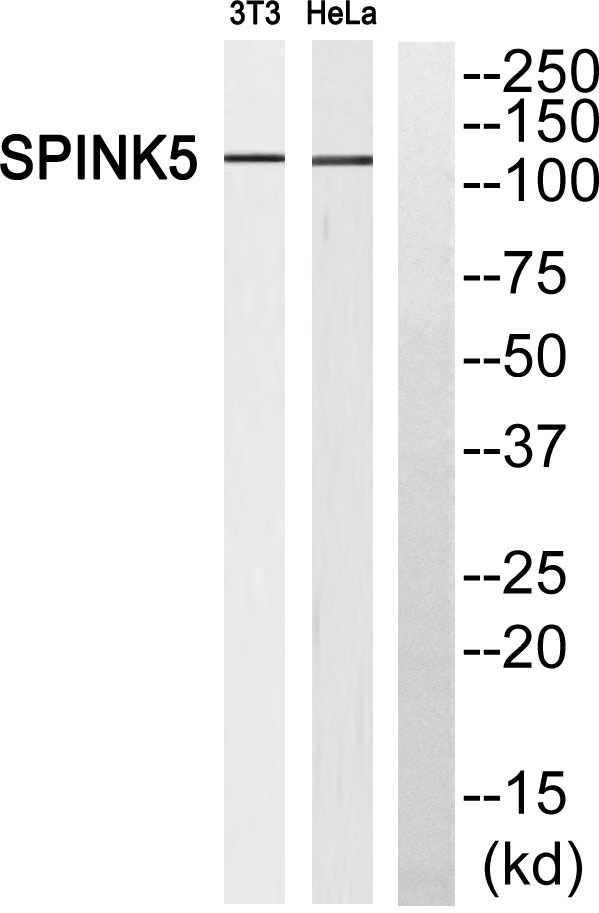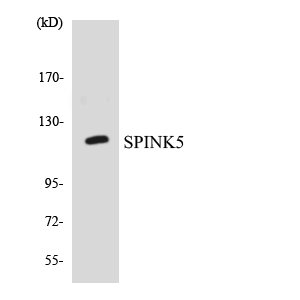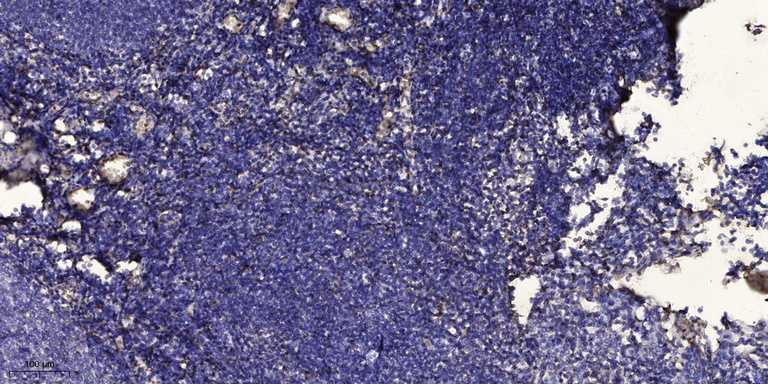LEKTI Polyclonal Antibody
- Catalog No.:YT2554
- Applications:WB;IHC;IF;ELISA
- Reactivity:Human
- Target:
- LEKTI
- Gene Name:
- SPINK5
- Protein Name:
- Serine protease inhibitor Kazal-type 5
- Human Gene Id:
- 11005
- Human Swiss Prot No:
- Q9NQ38
- Immunogen:
- The antiserum was produced against synthesized peptide derived from human SPINK5. AA range:494-543
- Specificity:
- LEKTI Polyclonal Antibody detects endogenous levels of LEKTI protein.
- Formulation:
- Liquid in PBS containing 50% glycerol, 0.5% BSA and 0.02% sodium azide.
- Source:
- Polyclonal, Rabbit,IgG
- Dilution:
- WB 1:500 - 1:2000. IHC 1:100 - 1:300. ELISA: 1:20000.. IF 1:50-200
- Purification:
- The antibody was affinity-purified from rabbit antiserum by affinity-chromatography using epitope-specific immunogen.
- Concentration:
- 1 mg/ml
- Storage Stability:
- -15°C to -25°C/1 year(Do not lower than -25°C)
- Other Name:
- SPINK5;Serine protease inhibitor Kazal-type 5;Lympho-epithelial Kazal-type-related inhibitor;LEKTI
- Observed Band(KD):
- 120kD
- Background:
- This gene encodes a multidomain serine protease inhibitor that contains 15 potential inhibitory domains. The encoded preproprotein is proteolytically processed to generate multiple protein products, which may exhibit unique activities and specificities. These proteins may play a role in skin and hair morphogenesis, as well as anti-inflammatory and antimicrobial protection of mucous epithelia. Mutations in this gene may result in Netherton syndrome, a disorder characterized by ichthyosis, defective cornification, and atopy. This gene is present in a gene cluster on chromosome 5. Alternative splicing results in multiple transcript variants. [provided by RefSeq, Oct 2015],
- Function:
- disease:Defects in SPINK5 are the cause of Netherton syndrome (NETH) [MIM:256500]. NETH is an autosomal recessive congenital ichthyosis associated with hair shaft abnormalities and anomalies of the immune system. Typical features are ichthyosis linearis circumflexa, ichthyosiform erythroderma, trichorrhexis invaginata (bamboo hair), atopic dermatitis, and hayfever. High postnatal mortality is due to failure to thrive, infections and hypernatremic dehydration.,domain:Contains at least one active inhibitory domain for trypsin (domain 6).,function:Serine protease inhibitor, probably important for the anti-inflammatory and/or antimicrobial protection of mucous epithelia.,online information:SPINK5 mutation db,similarity:Contains 15 Kazal-like domains.,tissue specificity:Highly expressed in the thymus. Also found in the oral mucosa, parathyroid gland, Bartholin's glands, tonsils, and vaginal e
- Subcellular Location:
- Secreted.
- Expression:
- Highly expressed in the thymus and stratum corneum. Also found in the oral mucosa, parathyroid gland, Bartholin's glands, tonsils, and vaginal epithelium. Very low levels are detected in lung, kidney, and prostate.
- June 19-2018
- WESTERN IMMUNOBLOTTING PROTOCOL
- June 19-2018
- IMMUNOHISTOCHEMISTRY-PARAFFIN PROTOCOL
- June 19-2018
- IMMUNOFLUORESCENCE PROTOCOL
- September 08-2020
- FLOW-CYTOMEYRT-PROTOCOL
- May 20-2022
- Cell-Based ELISA│解您多样本WB检测之困扰
- July 13-2018
- CELL-BASED-ELISA-PROTOCOL-FOR-ACETYL-PROTEIN
- July 13-2018
- CELL-BASED-ELISA-PROTOCOL-FOR-PHOSPHO-PROTEIN
- July 13-2018
- Antibody-FAQs
- Products Images

- Western Blot analysis of 3T3 cells using LEKTI Polyclonal Antibody

- Western blot analysis of SPINK5 Antibody. The lane on the right is blocked with the SPINK5 peptide.

- Western blot analysis of the lysates from COLO205 cells using SPINK5 antibody.

- Immunohistochemical analysis of paraffin-embedded human tonsil. 1, Antibody was diluted at 1:200(4° overnight). 2, Tris-EDTA,pH9.0 was used for antigen retrieval. 3,Secondary antibody was diluted at 1:200(room temperature, 30min).



